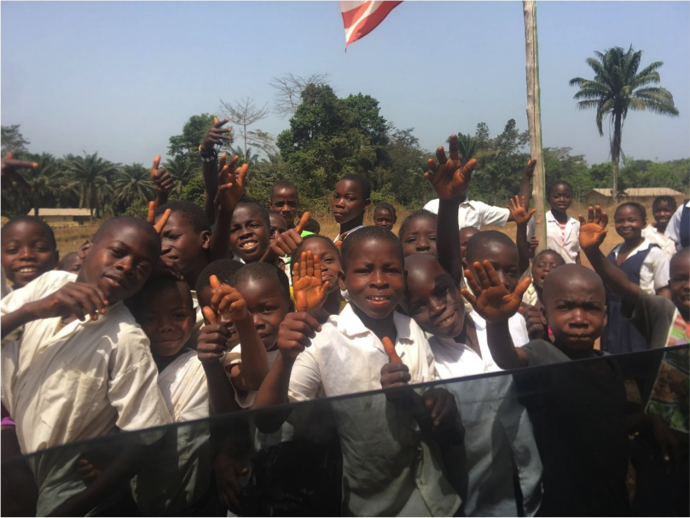February. Black History Month.
A time when African Americans reflect on those who paved the way for who and what we are today. A time when we think about our blackness, and what it means to us individually and collectively and how we can continue to navigate spaces in our current political time. Black History Month is a time of reflection but also a time where we seek pride in blackness and the contributions to society that African Americans have made.
For me, Black History Month has always been about taking the time to understand where I come from and who I am as a Black woman. In my experience, Black History Month has always been the cookie-cutter civil rights memorial covered for a week in History class, if at all. I was never shown the amazing things that African Americans had contributed to our society other than civil rights. It was not until college, through personal research that I began to understand and seek inspiration and representation for these people in agriculture. It was important for me to find people who looked like me and who were passionate about what I was passionate about, especially when others doubted me.
Here are the stories of those African Americans who inspired me to continue my journey in agriculture:
Henry Blair, born in 1807, this illiterate farmer was the second African American to be granted a patent to boost farm productivity by creating a seed planter and a cotton planter. 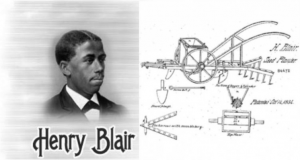 George Washington Carver, a botanist and inventor published a research bulletin called “How to prepare to grow peanuts and 105 ways of preparing it for human consumption” in 1916 and advised Mahatma Ghandi on agriculture and nutrition.
George Washington Carver, a botanist and inventor published a research bulletin called “How to prepare to grow peanuts and 105 ways of preparing it for human consumption” in 1916 and advised Mahatma Ghandi on agriculture and nutrition.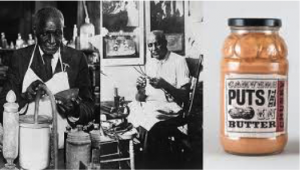
Dr. Llyod Augustus Hall, a chemist who contributed to the science of food preservation and whose research has led to the improved curing salts and meat preservation. He also discovered a method for sterilizing spices.
Percy Julian was a research chemist who pioneered in the chemical synthesis of medicinal drugs from plants. For example, a protein he extracted from soybeans was used to produce a fire-retardant foam in fire extinguishers, which saved thousands of soldiers’ lives during WWII.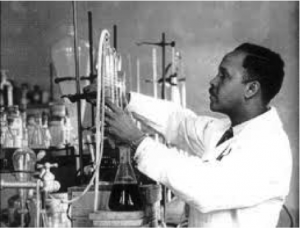
Norbert Rillieux, known for his invention of the multiple effect evaporator, an energy efficient means of evaporating water the invention was an important development in the growth of the sugar industry. 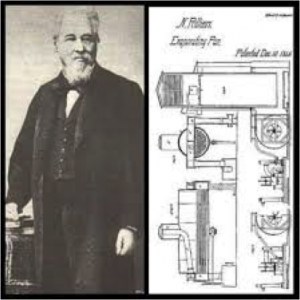 These are just a few of the African Americans who inspired me and fueled my passion as one of the few black agriculturalists that I know. As I grow in intellect and pride in my agricultural practice, it is very important for me to make sure that those who I work with seek to find representation in their passion. After all, we all want to feel connected. We all want to feel like we aren’t alone in our experiences. We all want to feel, “me too”.
These are just a few of the African Americans who inspired me and fueled my passion as one of the few black agriculturalists that I know. As I grow in intellect and pride in my agricultural practice, it is very important for me to make sure that those who I work with seek to find representation in their passion. After all, we all want to feel connected. We all want to feel like we aren’t alone in our experiences. We all want to feel, “me too”.
Here in my Liberian experience, my search hasn’t been narrowed down to black agriculturalists but simply those who are passionate. That is why I enjoy working with 4H- youth. Whenever I get to see those young men and women who are inspired by agriculture, my passionate fire continues to burn.
I’ve had the pleasure of meeting a few of those students who are passionate 4-H’ers and agriculturalists; so much so that they have taken their knowledge and passion home; using it to educate and empower their communities, feed their families and provide income.
As part of my job as an AgriCorps Fellow, I have the privilege of meeting with 4-H students, advisors and county field officers to see what they are up to and to see just how 4-H is impacting their lives. Here are the stories of some of my favorites:
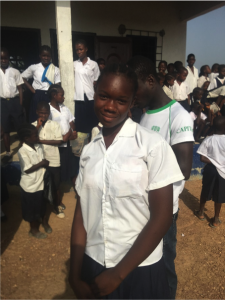 This is Veronica. She is a student at Jennipeleta Public School and is serving as the 4-H club president. She believes that 4-H is important because everyone involved can get something different out of it. She explained to me that she used the knowledge gained from 4-H to plant vegetables like greens and bitter ball at home, all of which she sells to help provide income for her family. She is really excited for her school to participate in the 4-H school gardening program and hopes that it is to be very successful. Lucky for her and the students of Jennipeleta, they have an amazingly enthusiastic agriculture advisor and dedicated 4-H field officer. It is my hope that in the coming months, I get to work with Veronica and her fellow students and see just how much her and the garden grows through 4-H!
This is Veronica. She is a student at Jennipeleta Public School and is serving as the 4-H club president. She believes that 4-H is important because everyone involved can get something different out of it. She explained to me that she used the knowledge gained from 4-H to plant vegetables like greens and bitter ball at home, all of which she sells to help provide income for her family. She is really excited for her school to participate in the 4-H school gardening program and hopes that it is to be very successful. Lucky for her and the students of Jennipeleta, they have an amazingly enthusiastic agriculture advisor and dedicated 4-H field officer. It is my hope that in the coming months, I get to work with Veronica and her fellow students and see just how much her and the garden grows through 4-H!
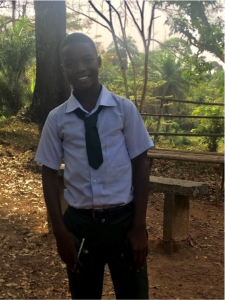 Jensen is a student at Youth Mission School in upper Bong county. After he finished his testing for the day, Jensen stopped us before we left to say hello. His warm smile and light heart reminded us how fruitful (no pun intended) 4-H has been in the lives of our students. Jensen currently uses his agricultural knowledge he gained from 4-H at home helping manage his family garden filled with greens, corn, potatoes and other crops. When asked about what he wants to be in the future he says “an agriculturalist! I want an orange farm!”, which is certainly something I have yet to see here in Liberia. When I first met Jensen, I remember be completely captivated by his sure drive for agriculture and 4-H. We hope to see Jensen at this year’s National 4-H Camp and Agriculture Fair because we know he is taking his learning back to his school, his peers, and his communities.
Jensen is a student at Youth Mission School in upper Bong county. After he finished his testing for the day, Jensen stopped us before we left to say hello. His warm smile and light heart reminded us how fruitful (no pun intended) 4-H has been in the lives of our students. Jensen currently uses his agricultural knowledge he gained from 4-H at home helping manage his family garden filled with greens, corn, potatoes and other crops. When asked about what he wants to be in the future he says “an agriculturalist! I want an orange farm!”, which is certainly something I have yet to see here in Liberia. When I first met Jensen, I remember be completely captivated by his sure drive for agriculture and 4-H. We hope to see Jensen at this year’s National 4-H Camp and Agriculture Fair because we know he is taking his learning back to his school, his peers, and his communities.
Lastly, there is the 4-H officer team of St. Thomas Lutheran Misson School. We had the pleasure of seeing their 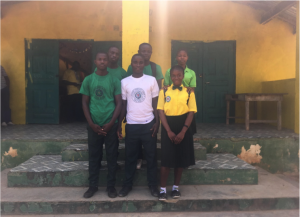 garden that is currently growing 146 plantain suckers. The club president Phillip (middle white shirt) enjoys being in this leadership position and plans to continue his studies in engineering soon. The club vice president Princess, (yellow shirt) said she would like to study both nursing and agriculture. She told me that 4-H has opened her mind to how important fruits and vegetables are.
garden that is currently growing 146 plantain suckers. The club president Phillip (middle white shirt) enjoys being in this leadership position and plans to continue his studies in engineering soon. The club vice president Princess, (yellow shirt) said she would like to study both nursing and agriculture. She told me that 4-H has opened her mind to how important fruits and vegetables are.
Visiting these schools and their students has shown me what passion looks like and what agriculture and 4H can do in the lives of those who are dedicated and willing to work. Speaking and working with these students has shown me that as a black woman I have the power to not only uplift myself but uplift those who look like and who share the same passion as me. In Liberian society, I believe that I encourage female students around me to be the best they can be, to be anything they want to be. I couldn’t be prouder than to say, I stand by my choice for agriculture. I am proud to be a black agriculturalist! The black agriculturalists of the past have ignited in me a desire to invest in the following generations of agriculturalists here in Liberia.
Sayvanna Sfabian received a bachelors degree in Animal Science from New York State College, Cobleskill and a masters in Agricultural Education from Cornell University. Before becoming an AgriCorps Fellow, Sayvanna spent several summers working on her family’s farm in the Dominican Republic.


